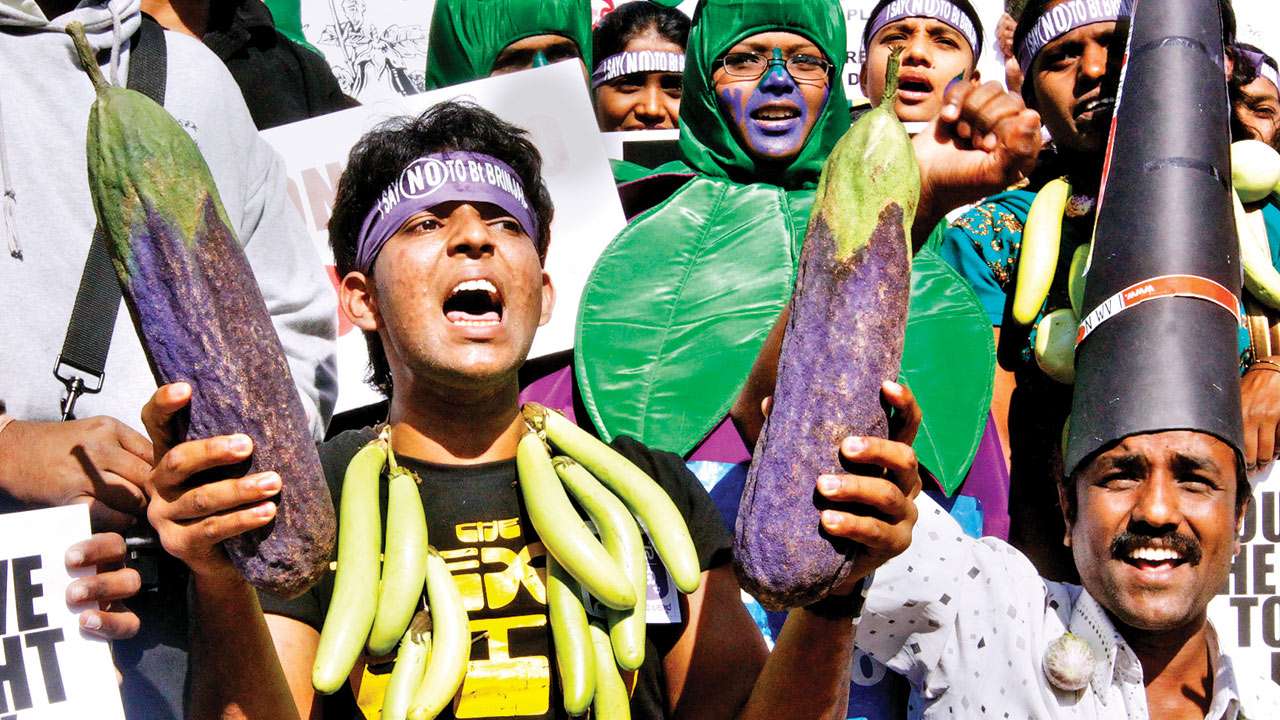
Illegal Bt brinjal, a genetically modified food crop cultivation, was discovered by alert activists recently in the Fatehabad district of Haryana.
It appears that other illegal Bt brinjal plots exist in the region. This is the first GM food crop entering the food chain in the country, being consumed by unaware citizens for some months now.
This appears to be the next episode of the tried and tested strategy of the biotech industry of “leak the seed, spread the illegal cultivation and then get an approval”.
Deployed across several countries, this is an established strategy to circumvent national legislation and consumer resistance that presents a fait accompli, followed by approvals and market manoeuvres to ultimately establish the monopoly of some seed giants.
In 2002, regulators faced with the fait accompli of illegal Bt cotton growing in large tracts of Gujarat were forced to approve Bt cotton. In 2009, it was Herbicide Tolerant (HT) cotton.
HT cotton is a triple whammy — illegal GM crop, illegal use of the deadly chemical glyphosate (it has resulted in its manufacturers dragged into many legal suits for its lethal health impacts) and displacing poor rural women from the work of weeding the fields.
The regulators turned a blind eye to the spread of such HT cotton until it reached lakhs of hectares across all the major cotton growing states, allowing the biotech industry to reap the benefits of booming glyphosate sales.
After public pressure, the action came in the form of four states stopping the sales of glyphosate. In November 2017, GM soy was found getting harvested in Gujarat. To this day, it is not clear what action has been taken against the seed suppliers, though the farmers’ produce has been confiscated, and kept at local police stations.
Instances of violations of biosafety norms during field trials abound too. The norms require produce from field trials to be carefully collected and destroyed. There have been some instances of the produce being sold to unsuspecting consumers.
Last year, the Centre for Science and Environment presented their lab-testing based findings on many unauthorised GM packaged foods having entered our supermarket shelves already, often times without being labelled so, and in all cases, illegal.
The story is no different when it comes to regulating imports of commodities like soy or corn, which are coming in from countries that predominantly grow only the transgenic versions of the crop.
There are numerous regulations being violated in these instances too, but there has been no deterrent action, as yet.
Our regulators have neither the capability nor the commitment to keep tabs on this uncontrollable, irreversible living technology.
It was nine years ago that the then Union Minister for Environment Jairam Ramesh, after a comprehensive process of nationwide public consultations, placed Bt brinjal commercial release on an indefinite moratorium “till such time independent scientific studies establish, to the satisfaction of both the public and professionals, the safety of the product from the point of view of its long-term impact on human health and environment, including the rich genetic wealth existing in brinjal in our country”.
The consultation process brought out several strong reasons for this moratorium. Public scientific scrutiny of Bt brinjal’s biosafety dossier by many independent scientists, very clearly pointed out that Bt brinjal cannot be concluded to be safe for cultivation or consumption.
Brinjal is, of course, a popular vegetable consumed in large quantities, more or less directly in all parts of the country. There are human health implications from this.
As seen in the case of Bt cotton, the target pest (fruit and shoot borer or FSB) will certainly develop resistance to the toxin produced in Bt brinjal.
There is the matter of hundreds of varieties of brinjal that grow in India. This poses a threat of irreversible contamination if Bt brinjal is allowed.
From the information in the public domain, no further scientific and independent studies have been taken up, leave alone on long term impacts of Bt brinjal. The moratorium continues to be in place — for the obvious reason that Bt brinjal has not been proven to be safe.
The government of India and the Haryana government have to work in unison to locate all Bt brinjal cultivating plots and destroy them immediately, while compensating farmers.
The seed supply network has to be traced fully, and cracked down upon. This requires deterrent penal action. India should also complain to the Secretariat of Cartagena Biosafety Protocol, which mandates that the trans-boundary movement of GM material cannot take place without prior informed consent.
Regulators have to take the responsibility of preparing frontline department functionaries to watch out for illegal GM seeds cultivation, and it is easy enough to zero in on suspected plots, and conduct preliminary tests.
If civil society can stay alert, so can responsible authorities from the government. It is not surprising that reports from Bangladesh (which approved Bt brinjal in 2013) indicate that Bt brinjal farmers are having to contend with a new pest and disease ecology in their crop. What is ironical and incomprehensible is how safer, effective and sustainable solutions are ignored time and again. There is evidence of effective FSB control with pheromone traps used not as surveillance, but control tools of the pest.
There are several other more comprehensive pest management practices. Why is it that this is not promoted with farmers?
Most importantly, it is the responsibility of the government to take sustainable agro-ecological practices to farmers, since the market-driven input industry is not likely to provide such extension advisories. This will protect farmers from misadventures with illegal seeds smuggled in.
Author is with Alliance for Sustainable and Holistic Agriculture